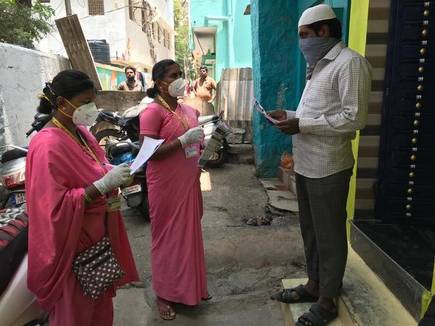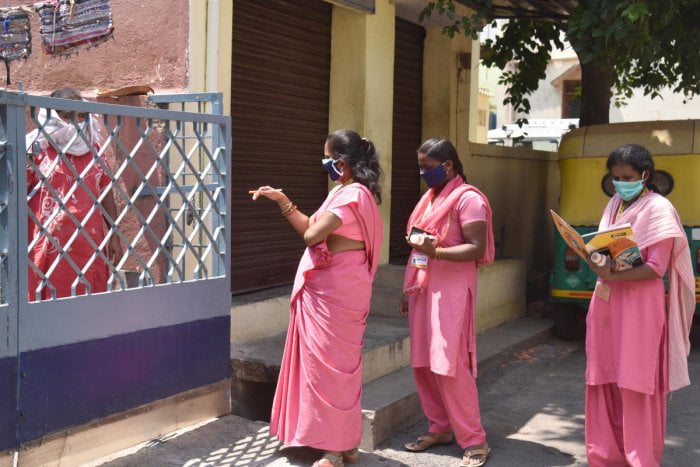Sunita, an ASHA worker in Dahanu, Maharashtra, was the first to inform the Kovara family of the COVID-19 epidemic. In no time, their daughter, who had been showing feverish symptoms, was referred to the nearest sub-district hospital by the ASHA worker. Her quick thinking not only ensured that their daughter was timely detected for COVID-19 but also led them to a successful recovery.

Sunita is among the 10 lakh ASHA workers in India who are spearheading the COVID-19 identification and community awareness programme on foot. They are conducting door to door surveillance to ensure uptake of social distancing and hand washing practices, addressing the misconceptions around COVID-19, and keeping apprised of households’ medical and psychosocial needs.
However, this walk as part of the COVID-19 health effort is not devoid of its share of roadblocks for the ASHA workers, who are now working longer hours with negligible Personal Protective Equipment (PPE). The pink sari-clad women stay outdoors for most of the day, mostly with makeshift masks formed using dupattas, and survey around 30 to 50 houses in a day depending on the risk levels of the area. Apart from putting them at an increased risk of exposure to the novel Coronavirus, this exercise also endangers their families. Such fears aggravate even further, especially given the gendered nature of domestic care work, forcing many ASHA workers out of duty at a challenging time like this.
‘No Washrooms Available’: ASHA In The Time Of COVID-19
Mamta, an ASHA worker from Gosaiganj, Lucknow, expresses the health anxieties of her family over COVID-19 and how it has begun to affect their attitude towards her work:
“The fear is natural…My husband, who is very supportive of my work otherwise, keeps telling me, ‘What is the need to work so hard. What if you fall sick?'”
Moreover, the risk of exposure to the virus has also set off a chain of violence and harassment against ASHA workers, who have also complained of facing hostility from families while collecting health data. Following this trend, the Indian government approved an ordinance on 22nd April 2020 to amend the Epidemic Diseases Act,1897 to protect its healthcare personnel, including ASHA workers, involved in the COVID-19 effort.
The risk of exposure to the virus has also set off a chain of violence and harassment against ASHA workers, who have also complained of facing hostility from families while collecting health data. Following this trend, the Indian government approved an ordinance on 22nd April 2020 to amend the Epidemic Diseases Act,1897 to protect its healthcare personnel, including ASHA workers, involved in the COVID-19 effort.
Furthermore, many ASHA workers, along with a lack of cooperation from community members, have also conveyed the unavailability of clean drinking water and proper sanitation facilities as an impediment to their mandated work. Sajidha, an ASHA worker from J.C. Nagar, Karnataka, speaks about the struggle of her colleagues in the COVID-19 effort:
“We leave home at 9.30 a.m. after wearing a mask and are done by around 2 p.m. We don’t drink water even in the scorching heat as when we are out on the field as there are no washrooms available.”
Also read: Female ASHA Workers Rally Demanding Better Wages And Working Conditions
Gendered Care Work and ASHA
These accounts by Mamta, Sajidha and many others are symptomatic, not only of a gender unconscious policy making but also of the patriarchal norms that form the basis for the perception of ASHA’s job responsibilities. Seen more as volunteering rather than a career service, their duties, primarily towards maternal and infant health, are considered simply an extension of their ‘perceived’ inclination for care work in general. Consequently, it fuels the government apathy not only towards ASHA workers’ poor working conditions but also to their repeated pleas for monetary security.

Although the Eleventh Parliamentary Committee Report on Empowerment of Women had recommended fixed remuneration for ASHA workers way back in 2010, they are yet to see salaries or employee benefits and continue to make do with an honorarium ranging from Rs. 2000-4000 on an average. Many ASHA workers have had to make out-of-pocket expenses to secure PPE kits, training materials and even stationery to perform their duties in the COVID-19 effort.
Even the various incentives that are attached to services like facilitating institutionalised delivery and child immunisation or providing contraception have faltered during COVID-19. Besides a lack of financial support, many ASHA workers are also coping with dwindling medical supplies at a time when womxn’s sexual and reproductive health concerns have increased owing to home quarantines and lockdowns.
‘I Am Helpless’: Compromised Sexual And Reproductive Healthcare
Even the various incentives that are attached to services like facilitating institutionalised delivery and child immunisation or providing contraception have faltered during COVID-19. Besides a lack of financial support, many ASHA workers are also coping with dwindling medical supplies at a time when womxn’s sexual and reproductive health concerns have increased owing to home quarantines and lockdowns.
Recently, an ASHA worker from Ajmer had to urgently intervene when a womxn was stopped by the police on their way to an abortion clinic upon failing to produce any evidence to prove the visit ‘essential’. Asha, another worker from Gudumba, Lucknow, had this to say:
“The women complain about the physical demands their husbands make on them. Women come to me begging for condoms, asking me to buy some, but I am helpless.”
As Accredited Social Health Activist (ASHA) workers take charge of the COVID-19 public health effort amidst calls for safe working conditions and fair remuneration, India needs to take stock of the gendered notions of care work that shape its public health policies. If India is to imagine a healthier world post-COVID-19, it needs to address the glaring gender issues that affect ASHA workers.
Also read: The Pandemic Is A Timely Reminder Of The Issues Faced By ASHA Workers
After all, what good is our applause if it does not translate to building a sustainable effort to empower our community health workers?
Featured Image Source: Deccan Herald




